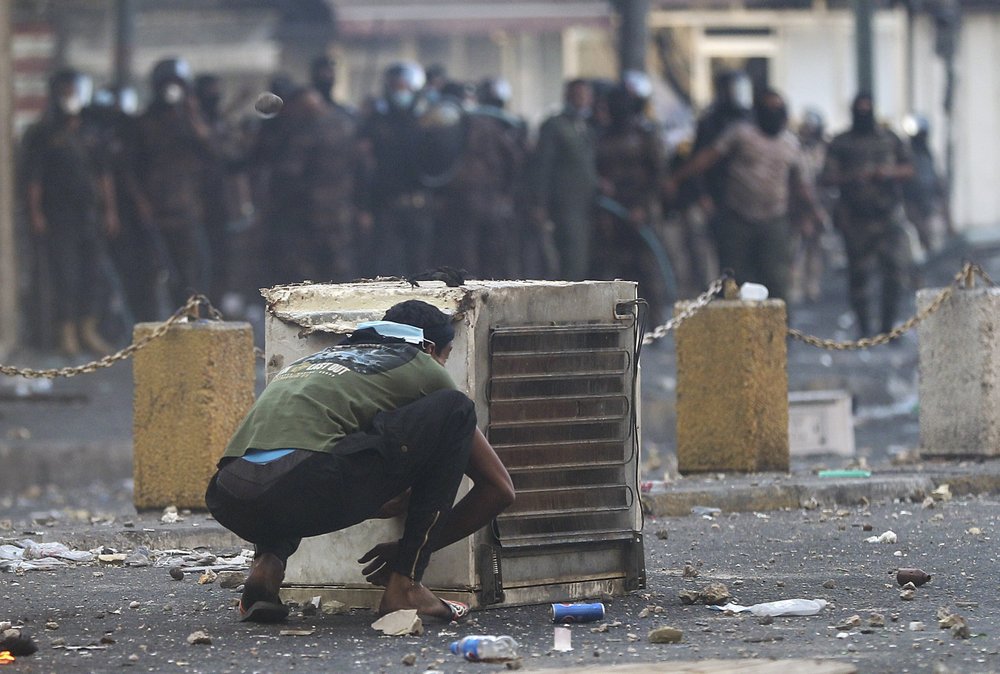
BAGHDAD (AP) — Iraqi security forces put up concrete barriers in central Baghdad Sunday, trying to hamper and block protesters’ movements a day after forcefully clearing three flashpoint bridges in a security operation that killed six anti-government protesters and left more than 100 wounded.
Since the unrest began last month, more than 260 protesters have been killed by security forces who have used live ammunition, rubber bullets and tear gas in an effort to quell the protests.
Amnesty International called it a “bloodbath” and said Iraqi authorities should immediately rein in security forces.
“The government of Iraq has a duty to protect its people’s right to life, as well as to gather and express their views. This bloodbath must stop now, and those responsible for it must be brought to justice,” said Heba Morayef, Amnesty International’s Middle East and North Africa Director.
The widening security crackdown reflects government intransigence and narrowing options for protesters who have been on the streets of Baghdad and the mainly Shia south’s cities for weeks. Authorities shut down internet access and blocked social media sites several times amid the demonstrations.
The leaderless, economically driven protests are targeting Iraq’s entire political class and calling for the overhaul of the sectarian system established after the 2003 US-led invasion.
More immediately, they are calling for the resignation of Prime Minister Adel Abdul-Mahdi’s government, who has held the post for just over a year. He has refused to step down.
“All government promises of reforms or investigations ring hollow while security forces continue to shoot and kill protesters,” Morayef added.
On Sunday, security forces closed roads near the Khilani Square with one-meter high concrete barriers, trying to block protesters from reaching Baghdad’s landmark Tahrir Square, the epicenter of the protests, and the Sanak bridge.
In the southern city of Nasiriyah, security and medical officials said 31 people were injured in confrontations outside the education directorate as security forces tear-gassed protesters trying to block employees from reaching the building in the city center. Among those wounded were two school students, they said, speaking on condition of anonymity in line with regulations.
On Saturday, Iraqi security forces killed six anti-government protesters and wounded more than 100 others, pushing them back from three flashpoint bridges in central Baghdad, medical and security officials said. The Iraqi officials spoke on condition of anonymity in line with regulations.
The deaths occurred as the protests intensified in the afternoon, when demonstrators tried to reach the three bridges spanning the Tigris River to the heavily fortified Green Zone, the seat of government. Protesters have tried to force their way across on an almost daily basis.
The demonstrators complain of widespread corruption, lack of job opportunities and poor basic services, including regular power cuts, despite Iraq’s vast oil reserves. They have rejected government proposals for limited economic reforms, and instead called on the country’s political leadership to resign, including Adel Abdul-Mahdi.
“We consider the peaceful protests of our people as among the most important events since 2003,” Abdul-Mahdi said in a statement Saturday that vowed to meet the protesters’ demands for wide-ranging reforms. He added that electoral reforms would be put forward soon along with “an important government reshuffle” in response to the protests against the sectarian system imposed in 2003, though the statement didn’t provide further details.
___
Associated Press writer Murtada Faraj contributed to this report.
An anti-government protester crouches down during a clash with Iraqi security forces in central Baghdad, Iraq, Saturday, Nov. 9, 2019. The protests intensified Saturday afternoon as demonstrators tried to reach the three bridges, hours after being pushed back under clouds of tear gas from the Sinak bridge to the nearby Khilani square. (AP Photo/Hadi Mizban)




